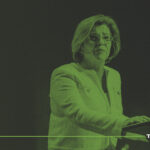Some Christians feel confident, equipped, and ready to share their faith. But if you’re not one of those people, you’re not alone. In fact, you’re in the majority.
In this conversation, Don Carson, Rebecca McLaughlin, and Matt Smethurst talk about the difference between feeling ready to evangelize and being ready. McLaughlin admits:
I’ve been trying in various ways to share my faith for almost 30 years now. And if being ready to share your faith means having a Christian life all together, I’m not ready. If it means not being fearful, I’m not ready. If it means having all the answers, I’m not ready. . . . On the other hand, anybody who knows Jesus and has the gospel is ready to share.
You don’t have to know all the answers to tough questions in order to share your faith. You simply need to be one who was lost and is found. And you might be surprised—the person you’re most afraid to speak might be the very person whose heart God has prepared to receive the gospel.
Mentioned in this Discussion
- Marks of the Messenger by Mack Stiles
- Evangelism: How the Whole Church Speaks of Jesus by Mack Stiles
Available for Preorder
- Confronting Christianity: 12 Hard Questions for the World’s Largest Religion by Rebecca McLaughlin
Transcript
The following is an uncorrected transcript generated by a transcription service. Before quoting in print, please check the corresponding audio for accuracy.
Matt Smethurst: Don and Rebecca, one thing that we all encounter in our own hearts and with people that we’re trying to lead is a fear, a fear of sharing our faith. So how do you go about leading someone to share their faith when they feel intimidated, they feel like they’re not yet ready to do it?
Rebecca McLaughlin: The first thing I’d say is join the club. I’ve been trying in various ways to share my faith for almost 30 years now. And if being ready to share your faith means having a Christian life all together, I’m not ready. If it means not being fearful, I’m not ready. If it means having all the answers, I’m not ready. So there’s one sense in which I think no Christian is really ready to share their faith in that sense. On the other hand, anybody who knows of Jesus and has The Gospel is ready to share. And that can look different ways for different people in different circumstances. But I think we’re either all not ready or all ready so long as we know who Jesus is and what he’s done for us,
Don Carson: There’s a book by Mack Stiles called ”Marks of the Messenger,” which is one of my favorite evangelism books. Doesn’t tell you how to do it. It doesn’t make you feel guilty because you don’t, but makes Christ and bearing witness so unquenchably attractive that you wanna go out and share the faith with somebody. And…
Smethurst: Kind of like hanging out with Mack himself.
Carson: Yeah, it’s exactly right. It’s very difficult not to wanna evangelize when you’re with Mack. And what that means is that ideally, you need to spend time with a person or with a book that makes Christ so lovely in your eyes that you can’t easily shut up. Now, there are lots of things to be said beyond that, but an awful lot of the initial fear has got to be overcome by a superlative gratitude to Christ. I don’t know any other way of getting around the challenge.
McLaughlin: I find another great tip is spending time with small children. So I was at the park a few years ago with my daughter who was then five. And she struck up a conversation with an older Chinese-speaking lady. And she asked her what her name was and she asked her where she came from and then she asked her did she trust in Jesus? And I was mortified and the lady didn’t properly hear her. So she asked her, ”You know, what did you say?” And my daughter said, ”Do you trust in Jesus?” And she didn’t hear her again. And my face was reddening. And eventually I thought, I’m just gonna have to say this.
And I said, ”Well, we’re actually a Christian family. And sometimes my daughter likes to ask if other people trust in Jesus too.” And I was ready for the ground to swallow me up and this older lady said, ”Oh, do I trust in Jesus? Yes, I trust in Jesus. This is the most important thing in the world and I’m so glad you do as well.” I thought my five year old had a natural boldness at the park that made me embarrassed. And it turned out to encourage this lovely older Christian lady in her experience and her faith, I would never have struck up that conversation. So I think there’s something about learning from other people’s join boldness or just lack of inhibition that we can grow out of sometimes.
Carson: So often, we think of sharing our faith in terms of having answers to people’s difficult questions. Whereas, an awful lot of the most effective evangelism is literally sharing our testimony. And that can be practiced, edited, written up. It’s something that can be taught and you can have the one-minute version correct. And it’s to get people to have that sort of thing prepared, I think is a huge advantage. And then if they’re afraid of questions that come along that they don’t know how to answer, then you need to train people to say, I don’t know. I don’t have a clue. Sorry. I’ll try and find out, but I can’t answer this. That sounds like a good question to me. And to walk with a little humility and admit what you don’t know while still talking about the joy of the Lord and the forgiveness of sins in your own experience and so on is far more effective than, having even excellent answers for any question that might come along.
Smethurst: Right. Earlier you mentioned that if we truly know Christ, then there’s a sense in which we have all that we need to share our faith or we don’t have anything. I mean, if we don’t know him, we don’t have anything. But I think, you know, an old preacher in the UK once said that we may not have a watertight argument, but we do have a watertight person. And it’s Jesus Christ that we may have any number of reasons for being theists, but ultimately we only have one reason for being Christians. And that’s Jesus Christ. We’ve met him and we want to introduce him to others. And I think that sometimes we, I know in my own life it’s the times when I have been most cold toward the things of God that I have not felt that compulsion to share with others is, as you were mentioning earlier Don. It hasn’t been that, that overflowing joy. And I think that Satan, he has the gift of discouragement.
He, I think we can underestimate how much the evil one wants to convince us that, you know, you’re not quite ready. You’re not gonna have an answer to that objection. You’re just gonna make a fool of yourself and actually put the car of Christianity in reverse by trying to have this conversation. But it’s helpful to remember that is in no way the case. What are some of the fears that you all have particularly encountered over the years in terms of evangelism?
McLaughlin: I don’t know about you but I find that speaking about Jesus to a stranger is quite easy. Because if they walk away and never want to see me again, I haven’t lost anything. Speaking to somebody I care about and I’m gonna be in relationship with longer term or who I could lose that relationship with by sharing my faith, and that’s happened, that’s where I become afraid. And I think sometimes we need to recognize that if we don’t have any fear in the sense of recognizing the risk and the vulnerability of speaking of Jesus and frankly expecting rejection as often as anything else, maybe we’re not actually putting our heart into this. Maybe we’re not really loving people as we seek to share the gospel with them.
So rather than seeing fear as an inhibition, I wonder if we should start seeing it as a signal that we’re maybe in the right place to vulnerably share our faith in Jesus with somebody who we love. And that’s not to say evangelizing in the street isn’t a wonderful thing. I think it is and something that we probably could all do more of. But that fear, at least for me, is always about a relationship. And that is a place where I want Jesus to inhabit my conversations at the most.
Smethurst: Yeah, I’ve been convicted before just by the thought that, you know, it’s probably not the presence of fear that is the number one thing keeping me from opening my mouth and bragging about my savior. It’s probably…I mean, that’s up there, the presence of fear. But the number one thing is probably the absence of love and the absence of joy because if you really love God and love the person, then you will overcome that fear. What about you, Don, in terms of fears that you’ve encountered or still do?
Carson: An awful lot of the evangelism that I do over the years has been in university context, university missions. I could tell you what university missions I’ve done in this calendar year. And that it shouldn’t, but it can bring its own, I don’t know what to call it, fear of academically being despised. In one west coast university I was at earlier this year, it, the topic meant that probably 10% of those who came were dons. They were lecturers, professors, and so the level, and then we always open it up to Q&A. And so the level of discussion was sophisticated. I was not with a bunch of first-year students, you know, where I’ve heard all their questions.
So that can engender a certain kind of fear as well. And I have to remind myself, if I get stumped, it’s not the end of the world. You say, sorry, I don’t have a clue. Look it up, send them something by email, keep the conversation going. So that is a fear at the end of the day, it’s a fear that stems from pride. You don’t want to lose face. And that’s not healthy. It’s not wise at all. So you just have to work through those things. And it’s what John Owen would’ve called the mortification of sin. You have to deal with it and confront it and keep going anyway, it seems to me.
McLaughlin: I think one of my most terrifying experiences of campus evangelism was when I was an undergrad. And we had a system whereby we would give out gospels to every undergraduate once a year. We would split the undergraduates up between the little Christian body. So you’ve got a list of people who we want people to go and knock on their door, give them a gospel, and invite them to a mission talk. And on my list was probably the coolest girl in my year. And she was beautiful and trendy and amazing, and socially here where I was socially here. And I put this girl at the absolute bottom of my list because I was frankly terrified of going and knocking on her door and embarrassing myself.
And finally when I worked through all the other people, I went up to her door, I knocked on it and I said, in the least expecting the answer yes way you could possibly imagine, “Here’s a gospel. We’re having some talks about Jesus next week. And I wondered if you wanted to come.” And she said, ”Oh yeah, I’d be really interested actually.” I could not have been more shocked because if I’d had to tell you who was the least likely person to respond to an invitation, it was her. And actually, she was one of the people who came for multiple nights. So it’s just been a reminder to me from my life that often the people we are most afraid to speak to you, for all sorts of bad reasons, turn out to be the people who are really ready to hear about Jesus.
Carson: You don’t know. You just don’t know.
McLaughlin: You don’t know.
Smethurst: Yeah. And not only whom, but you don’t know when that moment. One verse that really encourages me is Jeremiah 23:29 where God says, ”Is not my word like fire and like a hammer that breaks the rock in pieces?” We never know what hard hearts are going to be melted, are gonna be broken. And we never know when God loves to surprise, he loves to show off.
Carson: I think the mental framework that you bring to evangelism when you’re dealing with people in this country, very often in the south where they have some sort of biblical background and have heard of the 10 commandments, there’s a rising percentage of genuinely secular people. But there are an awful lot of people that have some sort of biblical formation. It’s different for when you’re evangelizing on the coast and there isn’t a single theological word they used with the same theological meaning as I use. They don’t know the Bible has two testaments and so on. And the questions that are bound to come up are way out there. They’re on another planet.
And I think that part of the fear that many Christians have is the fear of passing like ships in the night. They don’t know how to talk with secularists who buy into philosophical materialism and the other side doesn’t have a clue what you’re talking about, it sounds so ridiculous. And so there are fears that are bound up with the challenges of communicating on some sort of common ground. So it’s a person who has done evangelism only in sort of the Christianized corners of the world, may feel a quite different fear when you land on the streets of New York City. And that’s another one that has to be addressed I think by training.
Smethurst: Yeah. And Rebecca, I’ve heard you mention that, you know, we often think about evangelism just in terms of what we need to do in relation to the people outside the church. But I’ve heard you talk about evangelism within the church. What exactly do you have in mind?
McLaughlin: People stumble into our church buildings every Sunday for a whole range of reasons. I see this at the church that we are part of in Cambridge, Massachusetts. And one of the most meaningful evangelistic things that any of us can do every week is go and sit with a new person, particularly a new person who is there by themselves. It’s a low bar in terms of how equipped we need to be. Nobody’s asking us to deliver a sermon or cold call somebody out of the blue and ask to talk about Jesus. These people have walked into our buildings and quite often, they walk out again without anybody meaningfully connecting with them.
And I’ve seen time and again, a few months ago I had noticed a woman’s sitting by herself at our church. And I went up to talk with her and she said she’d grown up Catholic. She hadn’t been to church in 15 years and something hard in her life had brought her to church that day. I don’t know where she was with the Lord, but just being able to connect with her relationally enabled her then to get stuck into that church and to join our community group and to have the opportunities to grow in faith that she needed. So I think often we’re so focused on people out there and worrying about whether we’ll be equipped to handle their hard questions that we don’t notice the people who’ve literally walked into our meetings and a little bit of love and attention will open them up to the gospel.
Smethurst: Yeah, Don, you mentioned Mack’s book earlier “Marks of the Messenger”. He has a more recent one, “Evangelism, How The Whole Church Thinks Of Jesus”. And I think we can forget the corporate dimension to evangelism, which can be uniquely compelling. It’s interesting that in John 13, Jesus said, ”By this, all men will know you are disciples.” By the way, he doesn’t say, by the way, you love them, though that’s true. But he says by the way you love one another. So there’s something in our life together as a church that is not itself the Gospel but certainly embodies and adorns that good news of Jesus. Thanks for this conversation.
Involved in Women’s Ministry? Add This to Your Discipleship Toolkit
 We need one another. Yet we don’t always know how to develop deep relationships to help us grow in the Christian life. Younger believers benefit from the guidance and wisdom of more mature saints as their faith deepens. But too often, potential mentors lack clarity and training on how to engage in discipling those they can influence.
We need one another. Yet we don’t always know how to develop deep relationships to help us grow in the Christian life. Younger believers benefit from the guidance and wisdom of more mature saints as their faith deepens. But too often, potential mentors lack clarity and training on how to engage in discipling those they can influence.
Whether you’re longing to find a spiritual mentor or hoping to serve as a guide for someone else, we have a FREE resource to encourage and equip you. In Growing Together: Taking Mentoring Beyond Small Talk and Prayer Requests, Melissa Kruger, TGC’s vice president of discipleship programming, offers encouraging lessons to guide conversations that promote spiritual growth in both the mentee and mentor.
Don Carson (BS, McGill University; MDiv, Central Baptist Seminary, Toronto; PhD, University of Cambridge) is emeritus professor of New Testament at Trinity Evangelical Divinity School in Deerfield, Illinois, and cofounder and theologian-at-large of The Gospel Coalition. He has edited and authored numerous books. He and his wife, Joy, have two children.
Rebecca McLaughlin holds a PhD from Cambridge University and a theology degree from Oak Hill Seminary in London. She is the author of several books, including Confronting Christianity, The Secular Creed, Jesus Through the Eyes of Women, and Does the Bible Affirm Same-Sex Relationships?. You can follow her on X, Instagram, or her website.
Matt Smethurst serves as lead pastor of River City Baptist Church in Richmond, Virginia. He also cohosts and edits The Everyday Pastor podcast from The Gospel Coalition. Matt is the author of Tim Keller on the Christian Life: The Transforming Power of the Gospel (Crossway, 2025), Before You Share Your Faith: Five Ways to Be Evangelism Ready (10Publishing, 2022), Deacons: How They Serve and Strengthen the Church (Crossway, 2021), Before You Open Your Bible: Nine Heart Postures for Approaching God’s Word (10Publishing, 2019), and 1–2 Thessalonians: A 12-Week Study (Crossway, 2017). He and his wife, Maghan, have five children. You can follow him on Twitter/X and Instagram.

































